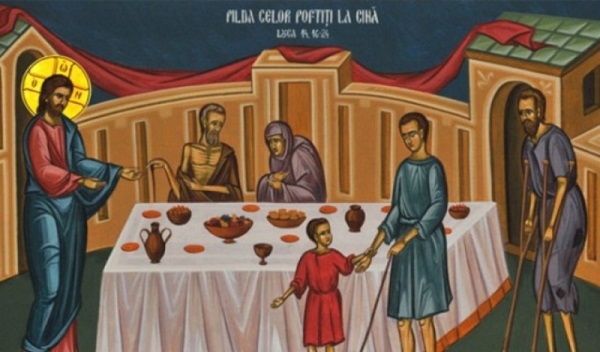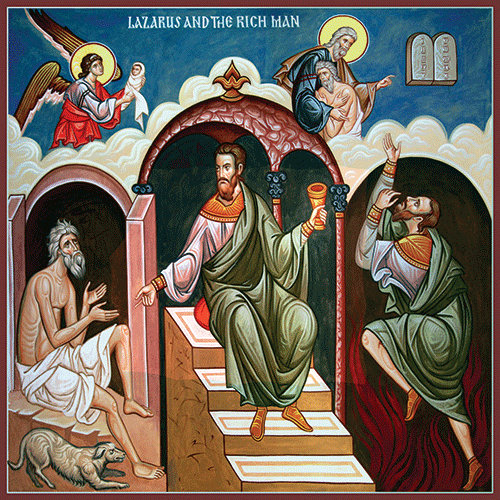Judging Others
Fourth Sunday after Trinity
“Be merciful, just as your Father is merciful. Do
not judge, and you will not be judged. Do not condemn, and you will not be
condemned. Forgive, and you will be forgiven. Give, and it will be given to
you. A good measure, pressed down, shaken together and running over, will be
poured into your lap. For with the measure you use, it will be measured to you”
(Luke 6:36-38).7
In Luke 6:36, Jesus calls us to be merciful as the
Father is merciful. How does the Father show His mercy to us? Mercy can be broadly
defined, according to Arndt, as love in relationship to suffering. At the very least,
it means a helpful attitude toward one who is in distress. More realistically, mercy
means real help for the one who is suffering. (Arndt 1929) God had mercy on
man; He provided real help for us in the midst of our suffering by sending
Jesus to be the propitiation for our sins. (Arndt 1929) Jesus teaches us here
to be merciful to our brother who is suffering or who is wrong. (Arndt 1929) The fact that God,
for the sake of Jesus, forgives all our sins against Him, even though we sin
against Him constantly in our thoughts, our words, and our deeds, should move
us to show the same kind of mercy to our neighbors. (Arndt 1929)
When Jesus says, “Give and it will be given to you,”
He is not describing “giving in order to get.” This is another application of
the Golden Rule: Do unto others as you would have others do unto you. (Prange
1988)
Prosperity gospel heretics misuse this, and other similar passages, to take advantage
of people who are suffering. They seduce vulnerable people into sending them large
sums of money with promises that if they just give their “seed offering” in
faith, God will reward them with a bountiful financial harvest. God will indeed
reward us for the mercy we show to others. Our prayer is that Jesus, our
merciful judge, would grant us forgiving hearts, even as He has forgiven us. (Arndt 1929)
Loving one’s neighbor as one’s self requires much
more than simply doing as you would be done by. It requires that you seek your
neighbor’s positive good. (Hitchens 2010) Love is the manifestation
of our gratitude to God for what He has done for us in Christ. (Arndt 1929) Love for our
neighbor demands that, when he is guilty of visible sin, we inform him and
correct him. Not to do so would be the opposite of love; it would be to allow
our neighbor to perish eternally. But, we must remember that even loving our
neighbor by doing for him good works does not earn salvation. Luther explains that
such love toward our neighbor serves as a sign to assure us that God loves us
and does indeed forgive us. (Concordia Publishing House 2009) Salvation is offered
to us by Christ; we take it by faith. (Arndt 1929)
Jesus does not forbid judgment when He says, “Do not
judge…do not condemn.” He forbids His disciples here from judging contrary to
the Eighth Commandment: We should fear and love God so that we do not tell lies
about our neighbor, betray him, slander him, or hurt his reputation, but defend
him, speak well of him, and explain everything in the kindest way. (Luther 2005) Arndt says, “We are
to use right judgment.” (Arndt 1929) Jesus teaches His
disciples to consider our own faults before we judge and correct someone else. (Arndt 1929) We know we belong to
Christ when we treat others as we want to be treated, and when we no longer
make a practice of sinning. Not that the Christian can become perfect and
sinless in this life. It is, rather, that we would struggle daily against our
sinful flesh and it’s desires, instead of pursuing them. The Christian has been
baptized into Christ’s death and resurrection. Since we died to sin, how can we
practice it any longer?[1]
This struggle to live according to the Spirit rather than according to the
flesh[2]
will last as long as we live in this fallen creation. We will struggle with our
sin until the Last Day, when Christ returns in judgment, casts sin, death, and
the devil into the lake of fire, and raises us to life everlasting in incorruptible,
immortal bodies, like His own.
Jesus demands of His disciples humility in judgment,
rather than the self-righteous judgment of the Pharisees. We are to judge in
love, and love is patient, kind, free from envy, modest, and humble.[3] (Arndt 1929) Some people think
that the fact that Christians struggle with their own faults and sins
disqualifies them from pointing out, warning of, or “judging” the sins of
others. Jesus says, rather than to ignore our brother’s sins, we should remove
the plank from our own eyes so that we can help our brother remove his speck. (Arndt 1929) Before you teach or
correct someone, make sure you are not in need of the same teaching or
correction. Jesus calls us all to self-examination against His standard, which
is God’s Law. (Arndt 1929)
Paul repeats, and spells out what Jesus teaches: “You,
therefore, have no excuse, you who pass judgment on someone else, for at
whatever point you judge the other, you are condemning yourself, because you
who pass judgement do the same things.[4]”
(Concordia Publishing House 2009) This is the hypocritical
judgement Jesus condemns. The term hypocrite was applied to an actor wearing a
mask; someone pretending to be someone else. (Concordia Publishing House 2009) The Christian who
judges his brother from a position of self-righteousness is pretending to be
something he is not – sinless. The only thing that will correct this hypocrisy
is brotherly love. (Arndt 1929) It is absurd to
point out the sins of others when one does not acknowledge or repent of one’s
own sins. The very message that Jesus preached was one of repentance: Repent,
and believe the Gospel.[5]
(Concordia Publishing House 2009) Be sorry and afraid
that you re sinful; trust that, in Christ all your sins have been taken away.
Of course, hypocritical judgment is not a disease
confined to Christians. Jesus, however, wants us to know about it and fight
against it in ourselves. Humans left to themselves, because of our sinful
nature, will justify the most abominable atrocities when they are done by
themselves, and at the same time vigorously condemn the very same actions when
committed by other groups. (Hitchens 2010) One only needs to
turn on the television to see the various special interest groups into which our
society has been shamefully divided screaming that they have been “wronged” by
the others, and looking to get even. No one will acknowledge that they have
ever done any harm to the others. Neither the “oppressed”, nor the “oppressors”
confess their sin; they all only lament their outrage at the others. We all
appear to have planks in our eyes.
A disciple of Jesus must see very clearly,
particularly their own faults, before correcting others. The closer we examine
ourselves, the more we will be forced to know that what God’s word says about
man is true: that no one is righteous; that we are by nature sinful and
unclean; that we are dead in trespasses and sins and are in need of a savior from
all of this. (Prange 1988) What a wretched man
I am! Who will rescue me from this body of death? Thanks be to God – through Jesus
Christ our Lord![6] ###
Bibliography
Arndt, W. 1929. "Fourth Sunday after
Trinity." In The Concordia Pulpit for 1930 ,
edited by Martin S. Somer, 133-140. St. Louis: Concordia Publishing House.
Concordia Publishing House. 2009. The Lutheran Study Bible.
Edited by Edward A Engelbrecht, Paul E Deterding, Roland Cap Ehlke, Jerald C
Joersz, Mark W Love, Steven P Mueller, Scott R Murray, et al. Saint Louis,
MO: Concordia Publishing House.
Hitchens, Peter. 2010. The Rage Against God: How atheism led me to
faith. Grand Rapids: Zondervan.
Luther, Martin. 2005. Luther's Small Catechism with Explanation.
St. Louis, MO: Concordia Publishing House.
Prange, Victor H. 1988. The People's Bible Commentary: Luke.
Milwaukee: Northwestern Publishing House.
[1]
Romans 6:2-3
[2]
See Galatians 5:16-26
[3]
1 Corinthians 13:4
[4]
Romans 2:1
[5]
Mark 1:15
[6]
Romans 7:24-25



